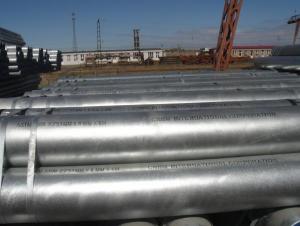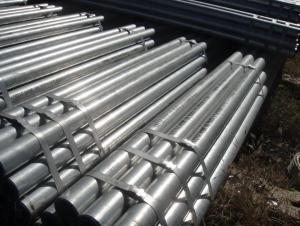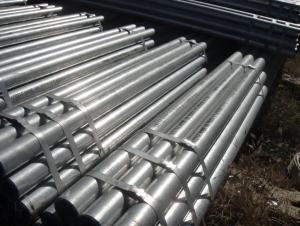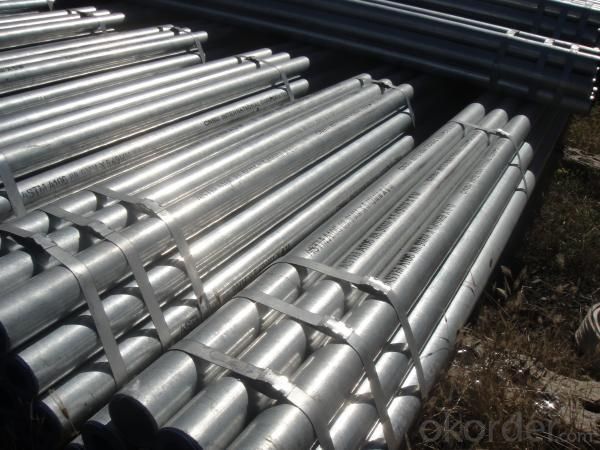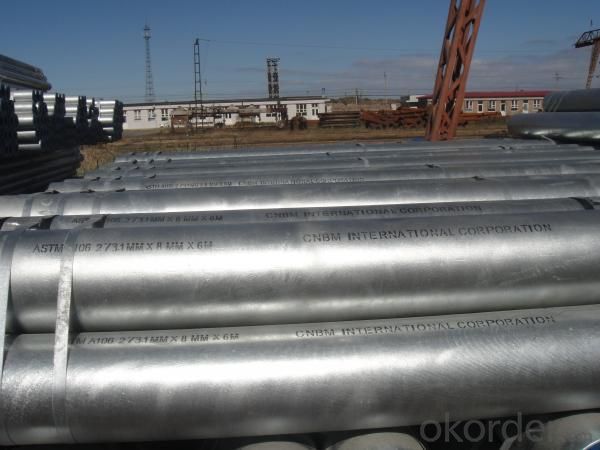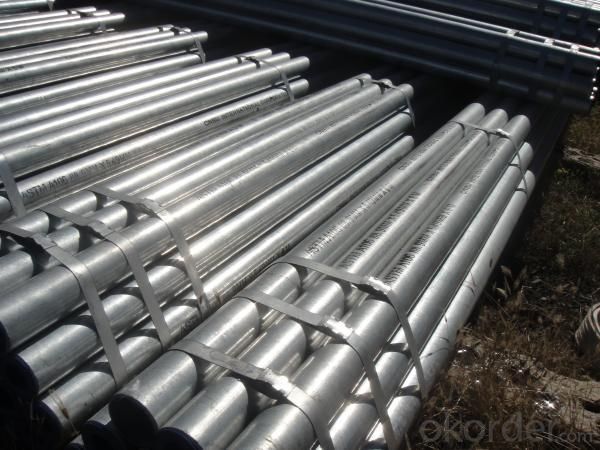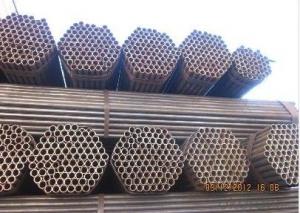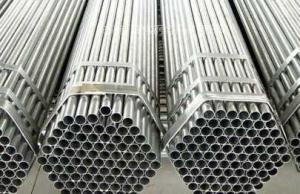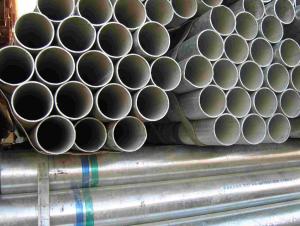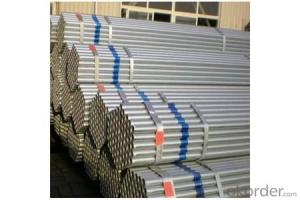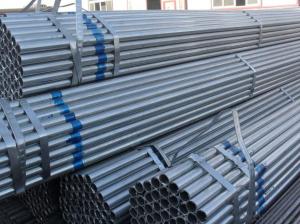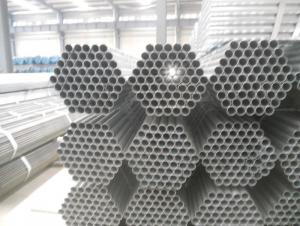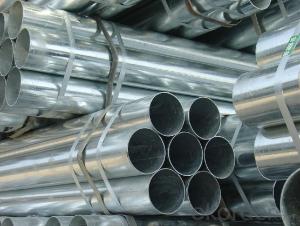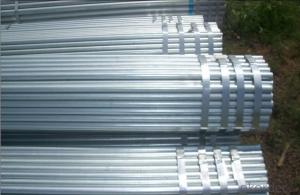ASTM A53 Heavy Hot Dipped Galvanized Pipe
- Loading Port:
- Tianjin
- Payment Terms:
- TT or LC
- Min Order Qty:
- 50 m.t.
- Supply Capability:
- 5000 m.t./month
OKorder Service Pledge
OKorder Financial Service
You Might Also Like
Application: It is widely used in building, machine, chemical equipment, automobile industrial, container, it is also applied to agriculture and mine machine.
Standard:ASTM A53,BS1387,GB3091
Steel grade: ASTM A53: A, B, C GB3091, BS1387:Q195,Q215,Q235
Thickness of zinc coating: 100g/m2, 120g/m2, 150g/m2, 200g/m2, 250g/m2, 300g/m2, 350g/m2. 400g/m2
Packaging & Delivery: Container or Bulk Cargo Negotiable
Size of Pipe:
OD(MM)
WT(MM) |
21.3 |
26.7 |
33.4 |
42.2 |
48.3 |
60.3 |
73 |
88.9 |
114.3 |
141.3 |
168.3 |
219.1 |
1.70 | √ | √ | √ | √ |
|
|
|
|
|
|
|
|
1.80 | √ | √ | √ | √ |
|
|
|
|
|
|
|
|
1.90 | √ | √ | √ | √ | √ | √ |
|
|
|
|
|
|
2.00 | √ | √ | √ | √ | √ | √ |
|
|
|
|
|
|
2.10 | √ | √ | √ | √ | √ | √ |
|
|
|
|
|
|
2.20 | √ | √ | √ | √ | √ | √ |
|
|
|
|
|
|
2.30 | √ | √ | √ | √ | √ | √ |
|
|
|
|
|
|
2.40 | √ | √ | √ | √ | √ | √ |
|
|
|
|
|
|
2.50 | √ | √ | √ | √ | √ | √ | √ | √ | √ |
| √ |
|
2.75 |
|
| √ | √ | √ | √ | √ | √ | √ | √ | √ | √ |
3.00 |
|
| √ | √ | √ | √ | √ | √ | √ | √ | √ | √ |
3.25 |
|
| √ | √ | √ | √ | √ | √ | √ | √ | √ | √ |
3.50 |
|
|
|
|
| √ | √ | √ | √ | √ | √ | √ |
3.75 |
|
|
|
|
|
| √ | √ | √ | √ | √ | √ |
4.00 |
|
|
|
|
|
|
| √ | √ | √ | √ | √ |
4.25 |
|
|
|
|
|
|
|
|
| √ | √ | √ |
4.50 |
|
|
|
|
|
|
|
|
|
| √ | √ |
4.75 |
|
|
|
|
|
|
|
|
|
|
| √ |
5.00 |
|
|
|
|
|
|
|
|
|
|
| √ |
5.25 |
|
|
|
|
|
|
|
|
|
|
| √ |
ASTM A53
ASTM A53 LIGHT ( HOT DIPPED GALVANIZED PIPES) | ||||||||||||||||
SIZE | Max | Min | Wall Thickness | Bare Pipes Weight | Screwed & Socketed Pipes Weight | |||||||||||
INCH | NB(MM) | mm | mm | mm | kg/m | kg/m | ||||||||||
1/2" |
15 |
21.4 |
21 |
2 |
0.947 |
0.956 | ||||||||||
3/4" |
20 |
26.9 |
26.4 |
2.3 |
1.38 |
1.39 | ||||||||||
1" |
25 |
33.8 |
33.2 |
2.6 |
1.98 |
2 | ||||||||||
1-1/4" |
32 |
42.5 |
41.9 |
2.6 |
2.54 |
2.57 | ||||||||||
1-1/2" |
40 |
48.4 |
47.8 |
2.9 |
3.23 |
3.27 | ||||||||||
2" |
50 |
60.2 |
59.6 |
2.9 |
4.08 |
4.15 | ||||||||||
2-1/2" |
65 |
76 |
75.2 |
3.2 |
5.71 |
5.83 | ||||||||||
3" |
80 |
88.7 |
87.9 |
3.2 |
6.72 |
6.39 | ||||||||||
3-1/2" | 90 | 113.9 | 113 | 3.6 | 9.75 | 10 | ||||||||||
ASTM A53 MEDIUME ( HOT DIPPED GALVANIZED PIPES) | ||||||||||||||||
SIZE | Max | Min | Wall Thickness | Bare Pipes Weight | Screwed & Socketed Pipes Weight | |||||||||||
INCH | NB(MM) | mm | mm | mm | kg/m | kg/m | ||||||||||
1/2" |
15 |
21.7 |
21.1 |
2.6 |
1.21 |
1.22 | ||||||||||
3/4" |
20 |
27.2 |
26.6 |
2.6 |
1.54 |
1.57 | ||||||||||
1" |
25 |
34.2 |
33.4 |
3.2 |
2.41 |
2.43 | ||||||||||
1-1/4" |
32 |
42.9 |
42.1 |
3.2 |
3.1 |
3.13 | ||||||||||
1-1/2" |
40 |
48.9 |
48.3 |
3.2 |
3.57 |
3.61 | ||||||||||
2" |
50 |
60.8 |
59.9 |
3.6 |
5.03 |
5.1 | ||||||||||
2-1/2" |
65 |
76.6 |
75.4 |
3.6 |
5.43 |
6.55 | ||||||||||
3" |
80 |
89.5 |
88.1 |
4.5 |
8.37 |
8.54 | ||||||||||
4" |
100 |
114.9 |
113.3 |
4.5 |
12.2 |
12.5 | ||||||||||
5" |
125 |
140.6 |
138.7 |
5 |
15.6 |
17.1 | ||||||||||
6" |
150 |
166.1 |
164.1 |
5 |
19.7 |
20.3 | ||||||||||
ASTM A53 HEAVY ( HOT DIPPED GALVANIZED PIPES) | ||||||||||||||||
SIZE | Max | Min | Wall Thickness | Bare Pipes Weight | Screwed & Socketed Pipes Weight | |||||||||||
INCH | NB(MM) | mm | mm | mm | kg/m | kg/m | ||||||||||
1/2" |
15 |
21.7 |
21.1 |
3.2 |
1.44 |
1.45 | ||||||||||
3/4" |
20 |
27.2 |
26.6 |
3.2 |
1.87 |
1.88 | ||||||||||
1" |
25 |
34.2 |
33.4 |
4 |
2.94 |
2.96 | ||||||||||
1-1/4" |
32 |
42.9 |
42.1 |
4 |
3.8 |
3.83 | ||||||||||
1-1/2" |
40 |
48.9 |
48.3 |
4 |
4.38 |
4.42 | ||||||||||
2" |
50 |
60.8 |
59.9 |
4.5 |
5.19 |
5.26 | ||||||||||
2-1/2" |
65 |
76.6 |
75.4 |
4.5 |
7.93 |
8.05 | ||||||||||
3" |
80 |
89.5 |
88.1 |
5 |
10.3 |
10.5 | ||||||||||
4" |
100 |
114.9 |
113.3 |
5.4 |
14.5 |
14.9 | ||||||||||
5" |
125 |
140.6 |
138.7 |
5.4 |
17.9 |
18.4 | ||||||||||
6" |
150 |
166.1 |
164.1 |
5.4 |
21.3 |
22.9 | ||||||||||
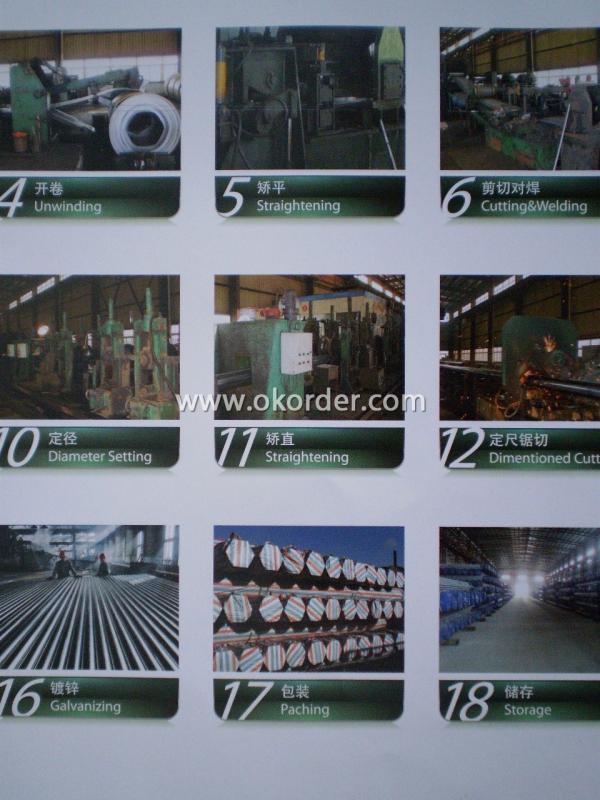
- Q: What are the common applications of galvanized steel pipes?
- Galvanized steel pipes are commonly used in various industries and applications such as plumbing, water supply systems, gas pipelines, electrical conduits, construction projects, fencing, and outdoor structures. The galvanization process adds a protective zinc coating to the steel, making it resistant to corrosion and extending its lifespan, making it ideal for applications requiring durability and longevity.
- Q: What are the different sizes of threads available for steel pipes?
- The different sizes of threads available for steel pipes can range from 1/8 inch to 4 inches, with various standard sizes in between.
- Q: Can steel pipes be used for mining applications?
- Yes, steel pipes can be used for mining applications. Steel pipes are known for their strength, durability, and resistance to extreme conditions, making them suitable for various mining activities such as transporting water, air, or chemicals, as well as for structural support and ventilation systems in mines.
- Q: How do you calculate the pipe buoyancy for steel pipes in water?
- To calculate the pipe buoyancy for steel pipes in water, you need to consider the weight of the water displaced by the submerged portion of the pipe. This can be done using Archimedes' principle, which states that the buoyant force on an object immersed in a fluid is equal to the weight of the fluid displaced by the object. First, calculate the volume of the submerged portion of the pipe. This can be done by multiplying the cross-sectional area of the pipe by the length of the submerged portion. Next, determine the density of the water in which the pipe is submerged. Typically, this value is around 1000 kg/m³ for freshwater and slightly higher for seawater. Multiply the volume of the submerged portion of the pipe by the density of the water to find the weight of the water displaced. Finally, compare the weight of the water displaced to the weight of the steel pipe. If the weight of the water displaced is greater than the weight of the pipe, the pipe will be buoyant and tend to float. If the weight of the pipe is greater, it will sink. It's important to note that other factors such as pipe design, wall thickness, and external forces acting on the pipe may also influence its buoyancy. Therefore, it's recommended to consult industry-specific guidelines or seek expert advice for accurate calculations in specific scenarios.
- Q: How are steel pipes protected against internal corrosion?
- Steel pipes are protected against internal corrosion primarily through the use of protective coatings such as epoxy or polyethylene. These coatings act as a barrier, preventing contact between the steel surface and corrosive substances present in the transported fluids. Additionally, corrosion inhibitors are often added to the transported fluids to further reduce the likelihood of internal corrosion. Regular inspections and maintenance are also carried out to identify any potential corrosion issues and address them promptly.
- Q: What are the factors to consider when selecting pipe materials for corrosive environments?
- When selecting pipe materials for corrosive environments, there are several important factors to consider in order to ensure the longevity and effectiveness of the piping system. 1. Corrosion Resistance: The most crucial factor to consider is the corrosion resistance of the pipe material. It is essential to choose a material that is highly resistant to corrosion, as corrosive environments can cause significant damage to pipes over time. Materials such as stainless steel, fiberglass, and certain types of plastics like PVC and CPVC are known for their excellent resistance to corrosion. 2. Chemical Compatibility: It is important to assess the chemical compatibility of the pipe material with the specific corrosive environment it will be exposed to. Different materials have different resistance levels to various chemicals, so it is crucial to ensure that the chosen material can withstand the specific chemicals present in the environment. Consulting chemical compatibility charts and seeking expert advice can help in making the right material selection. 3. Temperature and Pressure Requirements: The temperature and pressure conditions within the corrosive environment should also be considered when selecting pipe materials. Some materials may have limitations in terms of their temperature and pressure resistance, and exceeding these limits can lead to pipe failure. It is important to choose a material that can handle the required temperature and pressure ranges without compromising its structural integrity. 4. Cost: The cost of the pipe material and its installation should also be taken into account. While certain materials may be highly resistant to corrosion, they can also be more expensive. It is essential to strike a balance between the desired level of corrosion resistance and the available budget. 5. Maintenance and Durability: The maintenance requirements and overall durability of the pipe material should be evaluated as well. Some materials may require more frequent inspections, cleaning, or repairs compared to others. Considering the anticipated lifespan of the piping system and the ease of maintenance can help in selecting a material that will provide long-term reliability and cost-effectiveness. In conclusion, when selecting pipe materials for corrosive environments, one should consider factors such as corrosion resistance, chemical compatibility, temperature and pressure requirements, cost, and maintenance and durability. By carefully evaluating these factors, one can choose a pipe material that best suits the specific corrosive environment and ensures a reliable and long-lasting piping system.
- Q: How do steel pipes perform in marine environments?
- Steel pipes perform well in marine environments due to their high strength and corrosion resistance. The protective oxide layer formed on the surface of the steel helps prevent rust and deterioration caused by salty sea air and water. Additionally, steel pipes can withstand the high pressure and temperature fluctuations commonly found in marine applications, making them a reliable choice for transporting fluids and gases in offshore structures, ships, and other marine installations.
- Q: How are steel pipes connected to other materials like concrete or plastic?
- Various methods are commonly employed to connect steel pipes to other materials such as concrete or plastic. Among these methods, fittings play a significant role. Fittings, specialized components, serve to facilitate the connection between different materials or sections of pipe. These fittings are available in a variety of shapes and sizes, including elbows, tees, reducers, and couplings, and are designed to establish a dependable and leak-proof connection. When it comes to connecting steel pipes to concrete, one method involves the utilization of concrete anchors. These anchors are embedded within the concrete structure and provide a stable foundation for securing the steel pipe. Clamps or brackets are subsequently employed to attach the pipe to the anchor. In the case of joining steel pipes to plastic materials, the use of transition fittings proves to be effective. These fittings are specifically crafted to connect steel pipes with plastic pipes. They typically feature different connection mechanisms on each end, such as threads or compression fittings, enabling a secure and reliable joint. Welding techniques can also be employed to connect steel pipes to other materials in certain situations. Welding involves melting the ends of the steel and the other material together to create a robust joint. This method is commonly utilized for connecting steel pipes to steel structures or components. In summary, the connection of steel pipes to materials like concrete or plastic necessitates the utilization of specialized fittings, anchors, or welding techniques. These methods guarantee a secure, long-lasting connection capable of withstanding the demands of the given application.
- Q: Can steel pipes be used for transporting chemicals?
- Yes, steel pipes can be used for transporting chemicals. Steel pipes are known for their strength, durability, and resistance to corrosion, making them suitable for handling various chemicals. Additionally, steel pipes can withstand high pressure and temperature conditions, ensuring safe transportation of chemicals.
- Q: How are steel pipes protected against internal scaling?
- Steel pipes are protected against internal scaling through various methods such as chemical treatments, use of corrosion inhibitors, and regular maintenance and cleaning procedures. These measures help to prevent the formation of scale, which can reduce the pipe's efficiency and lifespan.
1. Manufacturer Overview
| Location | Tianjin, China |
| Year Established | 1999 |
| Annual Output Value | Above Thirty Million RMB |
| Main Markets | Main land; Middle East; Southeast Asia |
| Company Certifications | ISO 9001:2011;CE:2010 |
2. Manufacturer Certificates
| a) Certification Name | |
| Range | |
| Reference | |
| Validity Period |
3. Manufacturer Capability
| a) Trade Capacity | |
| Nearest Port | Tianjin |
| Export Percentage | 30% - 40% |
| No.of Employees in Trade Department | 101-200 People |
| Language Spoken: | English; Chinese |
| b) Factory Information | |
| Factory Size: | 50,000 square meters |
| No. of Production Lines | Above 14 |
| Contract Manufacturing | Hui Ke Steel Pipe Co,.Ltd |
| Product Price Range | Average |
Send your message to us
ASTM A53 Heavy Hot Dipped Galvanized Pipe
- Loading Port:
- Tianjin
- Payment Terms:
- TT or LC
- Min Order Qty:
- 50 m.t.
- Supply Capability:
- 5000 m.t./month
OKorder Service Pledge
OKorder Financial Service
Similar products
Hot products
Hot Searches
Related keywords
